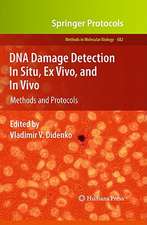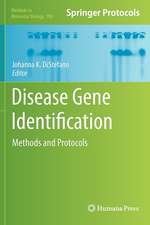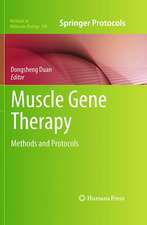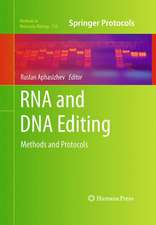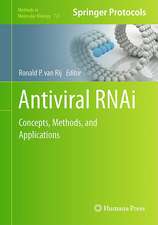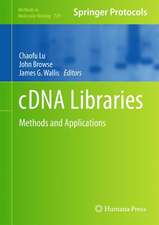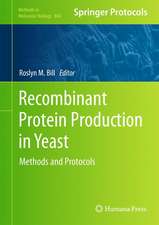Gene Therapy Protocols: Volume 1: Production and In Vivo Applications of Gene Transfer Vectors: Methods in Molecular Biology, cartea 433
Editat de Joseph LeDouxen Limba Engleză Hardback – 24 apr 2008
| Toate formatele și edițiile | Preț | Express |
|---|---|---|
| Paperback (2) | 721.40 lei 6-8 săpt. | |
| Humana Press Inc. – 2 noi 2014 | 721.40 lei 6-8 săpt. | |
| Humana Press Inc. – 4 noi 2014 | 1095.90 lei 6-8 săpt. | |
| Hardback (2) | 694.37 lei 38-44 zile | |
| Humana Press Inc. – 24 apr 2008 | 694.37 lei 38-44 zile | |
| Humana Press Inc. – 24 apr 2008 | 1105.04 lei 6-8 săpt. |
Din seria Methods in Molecular Biology
- 9%
 Preț: 791.59 lei
Preț: 791.59 lei - 23%
 Preț: 598.56 lei
Preț: 598.56 lei - 20%
 Preț: 882.95 lei
Preț: 882.95 lei -
 Preț: 252.04 lei
Preț: 252.04 lei - 5%
 Preț: 802.69 lei
Preț: 802.69 lei - 5%
 Preț: 729.61 lei
Preț: 729.61 lei - 5%
 Preț: 731.43 lei
Preț: 731.43 lei - 5%
 Preț: 741.30 lei
Preț: 741.30 lei - 5%
 Preț: 747.16 lei
Preț: 747.16 lei - 15%
 Preț: 663.45 lei
Preț: 663.45 lei - 18%
 Preț: 1025.34 lei
Preț: 1025.34 lei - 5%
 Preț: 734.57 lei
Preț: 734.57 lei - 18%
 Preț: 914.20 lei
Preț: 914.20 lei - 15%
 Preț: 664.61 lei
Preț: 664.61 lei - 15%
 Preț: 654.12 lei
Preț: 654.12 lei - 18%
 Preț: 1414.74 lei
Preț: 1414.74 lei - 5%
 Preț: 742.60 lei
Preț: 742.60 lei - 20%
 Preț: 821.63 lei
Preț: 821.63 lei - 18%
 Preț: 972.30 lei
Preț: 972.30 lei - 15%
 Preț: 660.49 lei
Preț: 660.49 lei - 5%
 Preț: 738.41 lei
Preț: 738.41 lei - 18%
 Preț: 984.92 lei
Preț: 984.92 lei - 5%
 Preț: 733.29 lei
Preț: 733.29 lei -
 Preț: 392.58 lei
Preț: 392.58 lei - 5%
 Preț: 746.26 lei
Preț: 746.26 lei - 18%
 Preț: 962.66 lei
Preț: 962.66 lei - 23%
 Preț: 860.21 lei
Preț: 860.21 lei - 15%
 Preț: 652.64 lei
Preț: 652.64 lei - 5%
 Preț: 1055.50 lei
Preț: 1055.50 lei - 23%
 Preț: 883.85 lei
Preț: 883.85 lei - 19%
 Preț: 491.88 lei
Preț: 491.88 lei - 5%
 Preț: 1038.84 lei
Preț: 1038.84 lei - 5%
 Preț: 524.15 lei
Preț: 524.15 lei - 18%
 Preț: 2122.34 lei
Preț: 2122.34 lei - 5%
 Preț: 1299.23 lei
Preț: 1299.23 lei - 5%
 Preț: 1339.10 lei
Preț: 1339.10 lei - 18%
 Preț: 1390.26 lei
Preț: 1390.26 lei - 18%
 Preț: 1395.63 lei
Preț: 1395.63 lei - 18%
 Preț: 1129.65 lei
Preț: 1129.65 lei - 18%
 Preț: 1408.26 lei
Preț: 1408.26 lei - 18%
 Preț: 1124.92 lei
Preț: 1124.92 lei - 18%
 Preț: 966.27 lei
Preț: 966.27 lei - 5%
 Preț: 1299.99 lei
Preț: 1299.99 lei - 5%
 Preț: 1108.51 lei
Preț: 1108.51 lei - 5%
 Preț: 983.72 lei
Preț: 983.72 lei - 5%
 Preț: 728.16 lei
Preț: 728.16 lei - 18%
 Preț: 1118.62 lei
Preț: 1118.62 lei - 18%
 Preț: 955.25 lei
Preț: 955.25 lei - 5%
 Preț: 1035.60 lei
Preț: 1035.60 lei - 18%
 Preț: 1400.35 lei
Preț: 1400.35 lei
Preț: 694.37 lei
Preț vechi: 730.91 lei
-5% Nou
Puncte Express: 1042
Preț estimativ în valută:
132.87€ • 139.08$ • 110.59£
132.87€ • 139.08$ • 110.59£
Carte tipărită la comandă
Livrare economică 27 martie-02 aprilie
Preluare comenzi: 021 569.72.76
Specificații
ISBN-13: 9781588299031
ISBN-10: 1588299031
Pagini: 464
Ilustrații: XII, 386 p.
Dimensiuni: 155 x 235 x 25 mm
Greutate: 0.81 kg
Ediția:3rd ed. 2008
Editura: Humana Press Inc.
Colecția Humana
Seria Methods in Molecular Biology
Locul publicării:Totowa, NJ, United States
ISBN-10: 1588299031
Pagini: 464
Ilustrații: XII, 386 p.
Dimensiuni: 155 x 235 x 25 mm
Greutate: 0.81 kg
Ediția:3rd ed. 2008
Editura: Humana Press Inc.
Colecția Humana
Seria Methods in Molecular Biology
Locul publicării:Totowa, NJ, United States
Public țintă
ResearchCuprins
Preparation and Quantification of Pseudotyped Retroviral Vector.- Production of Retroviral Vectors for Clinical Use.- Methods for the Production of Helper-Dependent Adenoviral Vectors.- Methods for the Production of First Generation Adenoviral Vectors.- Large-Scale Production of Recombinant Adeno-Associated Viral Vectors.- Construction and Production of Recombinant Herpes Simplex Virus Vectors.- Plasmid-Based Gene Transfer in Mouse Skeletal Muscle by Electroporation.- Chitosan Nanoparticle-Mediated Gene Transfer.- PEG–PEI Copolymers for Oligonucleotide Delivery to Cells and Tissues.- Non-Viral Gene Delivery with Cationic Liposome–DNA Complexes.- Applications of Lentiviral Vectors in Noninvasive Molecular Imaging.- Retroviral Modification of Mesenchymal Stem Cells for Gene Therapy of Hemophilia.- Transduction of Murine Hematopoietic Stem Cells and In Vivo Selection of Gene-Modified Cells.- Assessment of CFTR Function after Gene Transfer In Vitro and In Vivo.- Oncolytic Adenoviruses for Cancer Gene Therapy.- Design of Trans-Splicing Adeno-Associated Viral Vectors for Duchenne Muscular Dystrophy Gene Therapy.- Prevention of Type 1 Diabetes in NOD Mice by Genetic Engineering of Hematopoietic Stem Cells.- Lentiviral Vector Delivery of siRNA and shRNA Encoding Genes into Cultured and Primary Hematopoietic Cells.- Nanoparticle-Mediated Gene Delivery to the Lung.- Retroviral-Mediated Gene Therapy for the Differentiation of Primary Cells into a Mineralizing Osteoblastic Phenotype.- In Vivo siRNA Delivery to the Mouse Hypothalamus Shows a Role of the Co-Chaperone XAP2 in Regulating TRH Transcription.- Efficient Retroviral Gene Transfer to Epidermal Stem Cells.
Textul de pe ultima copertă
In Gene Therapy Protocols, Volumes 1 & 2, internationally recognized investigators describe cutting-edge laboratory techniques for the study of Production and In Vivo Applications of Gene Transfer Vectors (Volume 1) and Design and Characterization of Gene Transfer Vectors (Volume 2). The field of gene therapy has undergone remarkable advances, promising to impact human healthcare significantly in the twenty-first century. Today’s technologies can deliver genetic material safely and effectively to cells to slow or halt the progression of disease, and to help repair or regenerate damaged or lost tissues. In this first volume of Gene Therapy Protocols: Production and In Vivo Applications of Gene Transfer Vectors, readers will find a comprehensive resource of current and emerging methods for the production of viral and non-viral gene transfer vectors, as well as detailed protocols for critical applications in stem cell biology, cancer, diabetes, HIV and tissue engineering. This first volume of the new and completely revised third edition of Gene Therapy Protocols will prove a necessary tool for graduate students and postdoctoral fellows and invaluable to basic and clinical researchers in both industry and academia.
Caracteristici
Collects time tested, reproducible laboratory protocols, including tricks and hints, written by experts in the field Covers current and emerging methods for production of viral and non-viral gene transfer vectors Provides detailed protocols for applications in stem cell biology, cancer research and infectious disease
Recenzii
From the reviews of the third edition:
"This book reflects progress in the field with chapters on early stage vector development and in vitro evaluation, as well as others devoted to issues faced in preclinical and clinical development … . Readers of this book are likely to be those working in vector development, validation and production as well as those involved in gene-based clinical trials. The specialized nature of this book means that it will primarily be used by experienced researchers … ." (Christopher Ring, Microbiology Today, June, 2009)
"This book reflects progress in the field with chapters on early stage vector development and in vitro evaluation, as well as others devoted to issues faced in preclinical and clinical development … . Readers of this book are likely to be those working in vector development, validation and production as well as those involved in gene-based clinical trials. The specialized nature of this book means that it will primarily be used by experienced researchers … ." (Christopher Ring, Microbiology Today, June, 2009)





